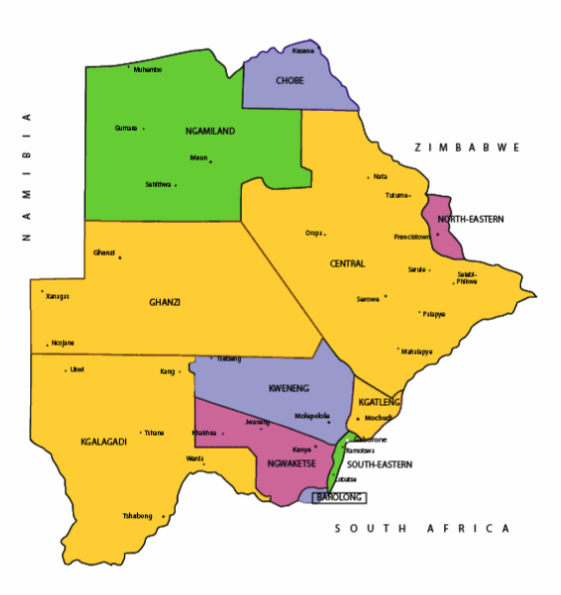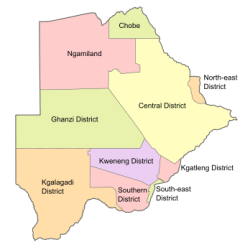Places and their polling stations in Molepolole South, Botswana
347 Lekgwapheng
1597 Lekgwapheng Primary School
1598 Tent At Gantshonyane
1599 Dbes Offices
348 Lephaleng
1600 Kgari Sechele SSS
1601 Lephaleng Primary School
1602 Boitshoko JSS
349 Ntloedibe
1603 Lewis Primary School
1604 Ntloedibe Kgotla
1605 Masilo JSS
350 Bonewamang
1606 Church of God In Christ (Cogic)
1607 Bonewamang Primary School
1608 Ramakgatlanyane VDC
1609 Sedumedi JSS
1610 Diagane Tent
351 Sebele
1611 Sebele Primary School
1612 Main Kgotla
1613 Free Church
1614 Senyedimana Kgotla
352 Loologa
1615 Neal Primary School
1616 Maunatlala Kgotla
1617 Food Resource
353 Mokgopeetsane
1618 Magokotswane Primary School
1619 Sanitation
1620 Seherelela
1621 Tent at Legonono
354 Gamodubu
1622 Mmamhiko VDC Huts
1623 Gamodubu Primary School
1624 Mmanoko Primary School
1625 Mabogoapitse (Tent)
Reference: iec.gov.bw/index.php/electoral-districts/polling-stations.html
Botswana
Botswana is a country in Africa. It is topographically flat, with approximately 70 percent of its territory being the Kalahari Desert.
It is bordered by South Africa to the south and southeast, Namibia to the west and north, and Zimbabwe to the northeast.
Capital: Gaborone
Currency: Botswanan Pula
Official language: English
Population: 2.588 million (2021) World Bank
Dialing code: +267
Gross Domestic Product: 17.61 billion USD (2021) World Bank
Botswana’s ten districts are:
- Southern District
- South-East District
- Kweneng District
- Kgatleng District
- Central District
- North-East District
- Ngamiland District
- Kgalagadi District
- Chobe District
- Ghanzi District
Botswana’s councils created from urban or town councils are: Gaborone City, Francistown, Lobatse Town, Selebi-Phikwe Town, Jwaneng Town, Orapa Town and Sowa Township.






The name Botswana refers to ‘Land of the Tswana’. The landlocked, Southern Africa country is officially known as the Republic of Botswana.














Botswana is connected to Zambia through the Kazungula Bridge making it the world’s shortest border between two countries.
A country of slightly over 2 million people (2021), Botswana is one of the most sparsely populated countries in the world. It is essentially the nation state of the Tswana ethnic group, who make up 79% of the population.

About 11.6 per cent of the population lives in the capital and largest city, Gaborone.
Formerly one of the world’s poorest countries—with a GDP per capita of about US$70 per year in the late 1960s—it has since transformed itself into an upper-middle-income country, with one of the world’s fastest-growing economies.


The Tswana ethnic group were descended mainly from Bantu-speaking tribes who migrated southward of Africa to modern Botswana, living in tribal enclaves as farmers and herders.




In 1885, the British colonised the area and declared a protectorate under the name of Bechuanaland.
As colonisation stopped, Bechuanaland became an independent republic under its current name on 30 September 1966.


Since then, it has been a representative republic, with a consistent record of uninterrupted democratic elections and the lowest perceived corruption ranking in Africa since at least 1998.

The economy is dominated by mining and tourism. Botswana has a GDP (purchasing power parity) per capita of about $18,113 as of 2021, one of the highest in subsaharan Africa.


Botswana is the world’s biggest diamond producing country.
Its relatively high gross national income per capita gives the country a high standard of living and the third-highest Human Development Index of continental Sub-Saharan Africa (after Gabon and South Africa).
The country has been adversely affected by the HIV/AIDS epidemic. In 2002, Botswana began offering anti-retroviral drugs (ARVs) to help combat the epidemic.
Botswana is a member of the Southern African Customs Union, the Southern African Development Community, the Commonwealth of Nations, and the United Nations.
